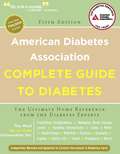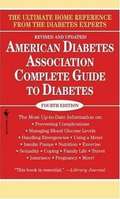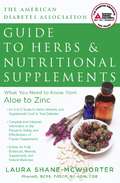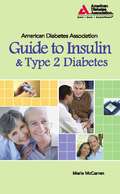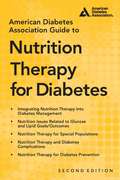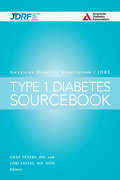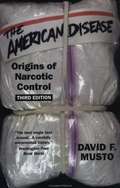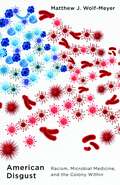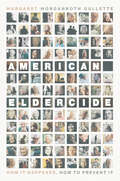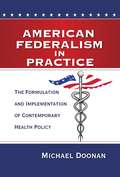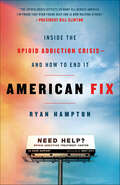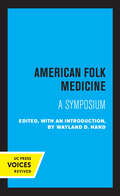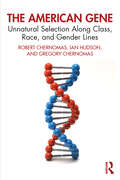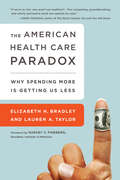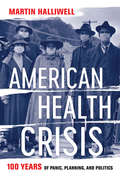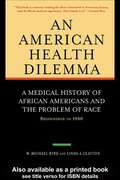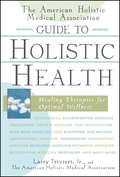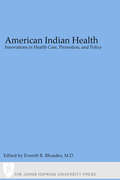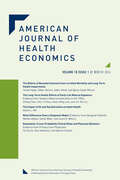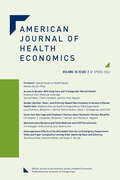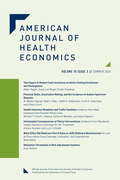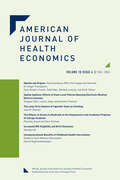- Table View
- List View
American Diabetes Association Complete Guide to Diabetes
by American Diabetes AssociationThe American Diabetes Association-the nation's leading health organization supporting diabetes research, information, and advocacy-has completely revised this comprehensive home reference to provide all the information a person needs to live an active, healthy life with diabetes. Now in its fifth edition, this extensive resource contains information on the best self-care techniques and the latest medical advances. For people with diabetes, this extraordinary guide will answer any question. Topics include the latest on self-care for type 1, type 2, and gestational diabetes; new types of insulin and medications; strategies for avoiding diabetes complications; expanded sections on meal planning and nutrition; and tips on working with the health care system and insurance providers.
American Diabetes Association Complete Guide to Diabetes (3rd Edition)
by American Diabetes AssociationBeginning with the assumption nothing is known about this disease by the reader, the book discusses types of diabetes, treatments, and the value of diet and exercise.
American Diabetes Association Guide to Herbs and Nutritional Supplements
by Laura Shane-McwhorterThe only guide to herbs and supplements for people with diabetes!More and more people are using nutritional supplements and natural remedies for health, but people with diabetes don't always understand how herbs and supplements can affect them. Many supplements can intensify and interfere with prescribed medications for diabetes. The American Diabetes Association Guide to Herbs and Nutritional Supplements lays out, in clear terms, pertinent information about why these popular herbs and nutritional supplements are used and how they affect prescription drugs. Take the guesswork out of taking herbs and supplements with this informative guide.
American Diabetes Association Guide to Insulin and Type 2 Diabetes
by Marie MccarrenUser-friendly guide covers all aspects of insulin use in type 2 diabetesThe American Diabetes Association Guide to Insulin & Type 2 Diabetes addresses common fears about insulin therapy and what is involved with beginning to use insulin. Additional chapters discuss fine-tuning of insulin self-management, gadgets to make life easier, and troubleshooting steps to overcome any problems readers may have.
American Diabetes Association Guide to Nutrition Therapy for Diabetes
by Alison Evert Marion J. FranzDiabetes greatly affects how people's bodies manage the food they eat. It is essential that people with diabetes follow a carefully structured meal plan and learn specific skills in order to better control their blood glucose levels. The tactics for helping people manage their diabetes through how they eat is called medical nutrition therapy (MNT).Here the American Diabetes Association presents all of the key information and strategies for effectively teaching patients how to manage their diets. Drawing on the knowledge and expertise of dozens of experts in the field, this book covers all of the key topics for implementing successful medical nutrition therapy.Topics include:Thorough discussion of nutrientsDescription of MNT for type 1 and type 2 diabetesDiscussion of providing MNT to special populations, including youth and older individualsExplanation of the different complications of diabetes, such as kidney disease, celiac disease, and cystic fibrosis, and how they impact MNTLatest details on new technology used in MNTGuidelines and strategies for teaching patients about nutrition therapy and how to use it in their daily livesUsing MNT to help prevent diabetes
The American Diabetes Association/JDRF Type 1 Diabetes Sourcebook
by Jane L. Chiang Lori M. Laffel Anne L. PetersThe American Diabetes Association/JDRF Type 1 Diabetes Sourcebook serves as both an evidence-based reference work and consensus report outlining the most critical components of care for individuals with type 1 diabetes throughout their lifespan. The volume serves not only as a comprehensive guide for clinicians, but also reviews the evidence supporting these components of care and provides a perspective on the critical areas of research that are needed to improve our understanding of type 1 diabetes diagnosis and treatment. The volume focuses specifically on the needs of patients with type 1 diabetes and provides clear and detailed guidance on the current standards for the optimal treatment of type 1 diabetes from early childhood to later life.To accomplish the book's editorial goals, Editors-in-Chief, Drs. Anne Peters and Lori Laffel, assembled an editorial steering committee of prominent research physicians, clinicians, and educators to develop the topical coverage. In addition, a Managing Editor was brought on to help the authors write and focus their chapters.
The American Disease
by David F. MustoThe American Disease is a classic study of the development of drug laws in the United States.
American Disgust: Racism, Microbial Medicine, and the Colony Within
by Matthew J. Wolf-MeyerExamining the racial underpinnings of food, microbial medicine, and disgust in America American Disgust shows how perceptions of disgust and fears of contamination are rooted in the country&’s history of colonialism and racism. Drawing on colonial, corporate, and medical archives, Matthew J. Wolf-Meyer argues that microbial medicine is closely entwined with changing cultural experiences of digestion, excrement, and disgust that are inextricably tied to the creation of whiteness. Ranging from nineteenth-century colonial encounters with Native people to John Harvey Kellogg&’s ideas around civilization and bowel movements to mid-twentieth-century diet and parenting advice books, Wolf-Meyer analyzes how embedded racist histories of digestion and disgust permeate contemporary debates around fecal microbial transplants and other bacteriotherapeutic treatments for gastrointestinal disease. At its core, American Disgust wrestles with how changing cultural notions of digestion—what goes into the body and what comes out of it—create and impose racial categories motivated by feelings of disgust rooted in American settler-colonial racism. It shows how disgust is a changing, yet fundamental, aspect of American subjectivity and that engaging with it—personally, politically, and theoretically—opens up possibilities for conceptualizing health at the individual, societal, and planetary levels.
An American Doctor in Ireland: Celebrate St. Patrick’s Day with an irresistible Irish surgeon in this captivating Medical Romance!
by Karin BaineThe gorgeous single dad she encountered at the St. Patrick&’s Day parade…is her new colleague! Will working together be too much temptation for these doctors? Read on in Karin Baine&’s latest Medical Romance! CAN A FLING LEAD TO FOREVER? American doctor Mae Watters arrives in Dublin, determined to escape her recent heartbreak. This move is about finding a new life, and the last thing on her mind is romance! So why can&’t she resist the man she meets at the St. Patrick&’s Day parade, her sexy colleague, Dr. Liam O&’Conner? He&’s a single dad with baggage of his own! Will a passionate fling give them the confidence to move forward—together?From Harlequin Medical: Life and love in the world of modern medicine.
American Eldercide: How It Happened, How to Prevent It
by Margaret Morganroth GulletteA bracing spotlight on the avoidable causes of the COVID-19 Eldercide in the United States. Twenty percent of the Americans who have died of COVID since 2020 have been older and disabled adults residing in nursing homes—even though they make up fewer than one percent of the US population. Something about this catastrophic loss of life in government-monitored facilities has never added up. Until now. In American Eldercide, activist and scholar Margaret Morganroth Gullette investigates this tragic public health crisis with a passionate voice and razor-sharp attention to detail, showing us that nothing about it was inevitable. By unpacking the decisions that led to discrimination against nursing home residents, revealing how governments, doctors, and media reinforced ageist or ableist biases, and collecting the previously little-heard voices of the residents who survived, Gullette helps us understand the workings of what she persuasively calls an eldercide. Gullette argues that it was our collective indifference, fueled by the heightened ageism of the COVID-19 era, that prematurely killed this vulnerable population. Compounding that deadly indifference is our own panic about aging and a social bias in favor of youth-based decisions about lifesaving care. The compassion this country failed to muster for the residents of our nursing facilities motivated Gullette to pen an act of remembrance, issuing a call for pro-aging changes in policy and culture that would improve long-term care for everyone.
American Federalism in Practice
by Michael DoonanAmerican Federalism in Practice is an original and important contribution to our understanding of contemporary health policy. It also illustrates how contentious public policy is debated, formulated, and implemented in today's overheated political environment.Health care reform is perhaps the most divisive public policy issue facing the United States today. Michael Doonan provides a unique perspective on health policy in explaining how intergovernmental relations shape public policy. He tracks federal-state relations through the creation, formulation, and implementation of three of the most important health policy initiatives since the Great Society: the State Children's Health Insurance Program (CHIP) and the Health Insurance Portability and Accountability Act (HIPAA), both passed by the U.S. Congress, and the Massachusetts health care reform program as it was developed and implemented under federal government waiver authority. He applies lessons learned from these cases to implementation of the Affordable Care Act."Health policymaking is entangled in a complex web of shared, overlapping, and/or competing power relationships among different levels of government," the author notes. Understanding federal-state interactions, the ways in which they vary, and the reasons for such variation is essential to grasping the ultimate impact of federalism on programs and policy. Doonan reveals how federalism can shift as the sausage of public policy is made while providing a new framework for comprehending one of the most polarizing debates of our time.
American Federalism in Practice: The Formulation and Implementation of Contemporary Health Policy
by Michael Doonan"American Federalism in Practice" is a major contribution to our understanding of contemporary health policy in America. Always an important topic, the issue holds special currency today given the prominence of health care in todays political and economic landscape. Michael Doonan provides a unique perspective on American federalism and U. S. health policy in explaining how intergovernmental relations shape public policy in health as well as other critical areas. Doonan tracks federal-state relations through the creation, formulation, and implementation of three of the most important health policy initiatives since the Great Society: the Childrens Health Insurance Program (CHIP) and the Health Insurance Portability and Accountability Act (HIPAA), both developed in Congress, and the Massachusetts health care reform program as it was developed and implemented under federal government waiver authority. Massachusetts, though not without having to face challenges, actually succeeded in lowering its uninsured rate to below two percent. Success and failure of these three programs can be traced in large part to a balance between state flexibility and accountability to meet program goals. Achieving that balance is not easy, of course, but lessons learned from previous successes --and failures --in structuring intergovernmental relations offer unique insights into national health reform and contemporary public policy. Doonan reveals how federalism can shift as the sausage of public policy is made, providing a previously missing link between federalism theory and practice. His work should change the way people think about federalism in a policy context while providing a new and useful framework through which we can view, and hopefully comprehend, some of the most important and polarizing policy debates of our time.
American Fix: Inside the Opioid Addiction Crisis—and How to End It
by Ryan HamptonNearly every American knows someone who has been affected by the opioid crisis. Addiction is a trans-partisan issue that impacts individuals from every walk of life. Millions of Americans, tired of watching their loved ones die while politicians ignore this issue. Where is the solution? Where is the hope? Where's the outrage?Ryan Hampton is a young man who has made addiction and recovery reform his life's mission. Through the wildly successful non-profit organization Facing Addiction, Hampton has been rocketed to the center of America’s rising recovery movement—quickly emerging as the de facto leader of the national conversation on addiction. He understands firsthand how easy it is to develop a dependency on opioids, and how destructive it can quickly become. Now, he is waging a permanent campaign to change our way of thinking about and addressing addiction in this country.In American Fix, Hampton describes his personal struggle with addiction, outlines the challenges that the recovery movement currently faces, and offers a concrete, comprehensive plan of action towards making America’s addiction crisis a thing of the past.
American Folk Medicine: A Symposium
by Donald J. WardThis title is part of UC Press's Voices Revived program, which commemorates University of California Press’s mission to seek out and cultivate the brightest minds and give them voice, reach, and impact. Drawing on a backlist dating to 1893, Voices Revived makes high-quality, peer-reviewed scholarship accessible once again using print-on-demand technology. This title was originally published in 1976.
The American Gene: Unnatural Selection Along Class, Race, and Gender Lines
by Robert Chernomas Ian Hudson Gregory ChernomasBiological justification for all forms of inequality has a long history, with the claim that particular groups suffer disproportionately from inherited flaws of ability and character used to explain a remarkably wide variety of inequalities.Providing an important critique of that biodeterminist history and how the Human Genome Project has inspired some contemporary scientists and economists to follow a similar path of ascribing socioeconomic outcomes to genetic inheritance, The American Gene details new research that suggests that the social and economic environment can affect how genes express themselves in specific human traits and social outcomes. Using the three cases of the American white working class, Black Americans and American women, the authors demonstrate that relying on nature as an explanation is seriously flawed – showing that the socioeconomic inheritance created by the conditions in which these populations worked and lived offer a far better explanation than nature for the stratified results.This book is the story of an American history rife with unnecessary misery and the waste of human potential, along with the liberating effect of understanding the degree to which its citizens are the product of social inheritance and the potential power of a nurturing economy and society that equality promises.
The American Health Care Paradox: Why Spending More Is Getting Us Less
by Harvey V. Fineberg Lauren A. Taylor Elizabeth H. BradleyForeword by Harvey V. Fineberg, President of the Institute of MedicineFor decades, experts have puzzled over why the US spends more on health care but suffers poorer outcomes than other industrialized nations. Now Elizabeth H. Bradley and Lauren A. Taylor marshal extensive research, including a comparative study of health care data from thirty countries, and get to the root of this paradox: We've left out of our tally the most impactful expenditures countries make to improve the health of their populations-investments in social services. In The American Health Care Paradox, Bradley and Taylor illuminate how narrow definitions of "health care," archaic divisions in the distribution of health and social services, and our allergy to government programs combine to create needless suffering in individual lives, even as health care spending continues to soar. They show us how and why the US health care "system" developed as it did; examine the constraints on, and possibilities for, reform; and profile inspiring new initiatives from around the world. Offering a unique and clarifying perspective on the problems the Affordable Care Act won't solve, this book also points a new way forward.
American Health Crisis: One Hundred Years of Panic, Planning, and Politics
by Martin HalliwellA history of U.S. public health emergencies and how we can turn the tide. Despite enormous advances in medical science and public health education over the last century, access to health care remains a dominant issue in American life. U.S. health care is often hailed as the best in the world, yet the public health emergencies of today often echo the public health emergencies of yesterday: consider the Great Influenza Pandemic of 1918–19 and COVID-19, the displacement of the Dust Bowl and the havoc of Hurricane Maria, the Reagan administration’s antipathy toward the AIDS epidemic and the lack of accountability during the water crisis in Flint, Michigan. Spanning the period from the presidency of Woodrow Wilson to that of Donald Trump, American Health Crisis illuminates how—despite the elevation of health care as a human right throughout the world—vulnerable communities in the United States continue to be victimized by structural inequalities across disparate geographies, income levels, and ethnic groups. Martin Halliwell views contemporary public health crises through the lens of historical and cultural revisionings, suturing individual events together into a narrative of calamity that has brought us to our current crisis in health politics. American Health Crisis considers the future of public health in the United States and, presenting a reinvigorated concept of health citizenship, argues that now is the moment to act for lasting change.
An American Health Dilemma: A Medical History of African Americans and the Problem of Race: Beginnings to 1900
by W. Michael Byrd Linda A. ClaytonAt times mirroring and at times shockingly disparate to the rise of traditional white American medicine, the history of African-American health care is a story of traditional healers; root doctors; granny midwives; underappreciated and overworked African-American physicians; scrupulous and unscrupulous white doctors and scientists; governmental support and neglect; epidemics; and poverty. Virtually every part of this story revolves around race. More than 50 years after the publication of An American Dilemma, Gunnar Myrdal's 1944 classic about race relations in the USA, An American Health Dilemma presents a comprehensive and groundbreaking history and social analysis of race, race relations and the African-American medical and public health experience. Beginning with the origins of western medicine and science in Egypt, Greece and Rome the authors explore the relationship between race, medicine, and health care from the precursors of American science and medicine through the days of the slave trade with the harrowing middle passage and equally deadly breaking-in period through the Civil War and the gains of reconstruction and the reversals caused by Jim Crow laws. It offers an extensive examination of the history of intellectual and scientific racism that evolved to give sanction to the mistreatment, medical abuse, and neglect of African Americans and other non-white people. Also included are biographical portraits of black medical pioneers like James McCune Smith, the first African American to earn a degree from a European university, and anecdotal vignettes,like the tragic story of "the Hottentot Venus", which illustrate larger themes.An American Health Dilemma promises to become an irreplaceable and essential look at African-American and medical history and will provide an invaluable baseline for future exploration of race and racism in the American health system.
The American Holistic Medical Association Guide to Holistic Health: Healing Therapies for Optimal Wellness
by Larry Trivieri American Holistic Medical Association StaffA complete and comprehensive guide to holistic treatment. Find reputable practitioners and put proven healing therapies to work in your life with this informative and reliable guide to holistic medicine and its primary treatment methods.
American Indian Health: Innovations in Health Care, Promotion, and Policy
by Everett R. RhoadesDisease processes among American Indians and Alaska Natives often have distinct manifestations that need to be considered by clinicians and health policy makers involved with these populations. Equally important, all aspects of Indian life—including health—are governed by the special relationship between Indian tribes and the U.S. federal government. For American Indian Health, Everett R. Rhoades has gathered a distinguished group of scholars and practitioners to present a comprehensive assessment of the health of American Indian peoples today and the delivery of health services to them.
American Indian Medicine (The Civilization of the American Indian #95)
by Virgil J. VogelThe purpose of this book, says the author, is to show the effect of Indian medicinal practices on white civilization. It discusses Indian theories of disease and methods of combating disease and even goes into the question of which diseases were indigenous and which were brought to the Indian by the white man. It also lists Indian drugs that have won acceptance in the Pharmacopeia of the United States and the National Formulary.
American Journal of Health Economics, volume 10 number 1 (Winter 2024)
by American Journal of Health EconomicsThis is volume 10 issue 1 of American Journal of Health Economics. The American Journal of Health Economics (AJHE) provides a forum for the in-depth analysis of health care markets and individual health behaviors. The articles appearing in AJHE are authored by scholars from universities, private research organizations, government, and industry. Subjects of interest include competition among private insurers, hospitals, and physicians; impacts of public insurance programs; pharmaceutical innovation and regulation; medical device supply; the rise of obesity and its consequences; the influence and growth of aging populations; and much more. The journal is published for the American Society of Health Economists (ASHEcon), which is a professional, non-profit organization dedicated to promoting excellence in health economics research in the United States.
American Journal of Health Economics, volume 10 number 2 (Spring 2024)
by American Journal of Health EconomicsThis is volume 10 issue 2 of American Journal of Health Economics. The American Journal of Health Economics (AJHE) provides a forum for the in-depth analysis of health care markets and individual health behaviors. The articles appearing in AJHE are authored by scholars from universities, private research organizations, government, and industry. Subjects of interest include competition among private insurers, hospitals, and physicians; impacts of public insurance programs; pharmaceutical innovation and regulation; medical device supply; the rise of obesity and its consequences; the influence and growth of aging populations; and much more. The journal is published for the American Society of Health Economists (ASHEcon), which is a professional, non-profit organization dedicated to promoting excellence in health economics research in the United States.
American Journal of Health Economics, volume 10 number 3 (Summer 2024)
by American Journal of Health EconomicsThis is volume 10 issue 3 of American Journal of Health Economics. The American Journal of Health Economics (AJHE) provides a forum for the in-depth analysis of health care markets and individual health behaviors. The articles appearing in AJHE are authored by scholars from universities, private research organizations, government, and industry. Subjects of interest include competition among private insurers, hospitals, and physicians; impacts of public insurance programs; pharmaceutical innovation and regulation; medical device supply; the rise of obesity and its consequences; the influence and growth of aging populations; and much more. The journal is published for the American Society of Health Economists (ASHEcon), which is a professional, non-profit organization dedicated to promoting excellence in health economics research in the United States.
American Journal of Health Economics, volume 10 number 4 (Fall 2024)
by American Journal of Health EconomicsThis is volume 10 issue 4 of American Journal of Health Economics. The American Journal of Health Economics (AJHE) provides a forum for the in-depth analysis of health care markets and individual health behaviors. The articles appearing in AJHE are authored by scholars from universities, private research organizations, government, and industry. Subjects of interest include competition among private insurers, hospitals, and physicians; impacts of public insurance programs; pharmaceutical innovation and regulation; medical device supply; the rise of obesity and its consequences; the influence and growth of aging populations; and much more. The journal is published for the American Society of Health Economists (ASHEcon), which is a professional, non-profit organization dedicated to promoting excellence in health economics research in the United States.
